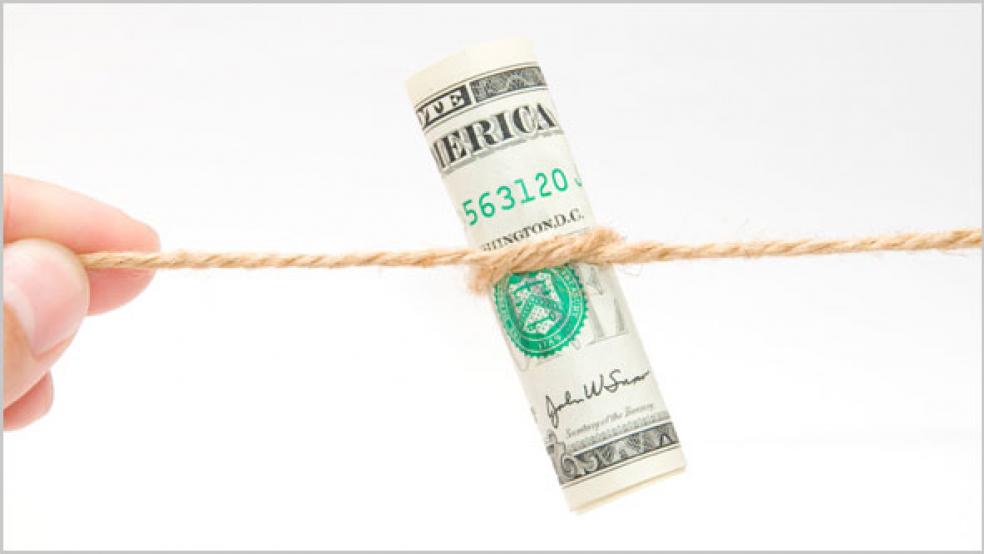There’s only one thing you can do in Washington these days that would be worse than tweeting your underpants. And that would be to “friend” a tax loophole. Loopholes, just to be clear, are a subset of the fiscal tool policy wonks call tax expenditures—that is, tax breaks intended to aid some favored group or promote some socially desirable behavior. Tax expenditures, naturally, cost the Treasury revenue and widen the deficit. If it’s in a good cause, fine. If not, it’s a loophole.
In the war against demon deficit, whacking loopholes is a sanctified bi-partisan pastime. The L-word figures centrally in every tax reform plan from the President’s Fiscal Commission to Republican Congressman Paul Ryan’s Road Map for America’s Future. Tim Pawlenty’s ultra-Republican economic manifesto last week took only the most recent swipe at a tax code “littered with special interest handouts, carve-outs, subsidies, and loopholes that should be eliminated.” Loophole-ectomy is right there in President Obama’s platform, too: "Get rid of the loopholes,” he said in his State of the Union address. “Level the playing field.”
So what if you actually did try to get rid of them? You’d have lots of options, for starters: The President’s 2012 budget lists 173 tax expenditures, ranging from monsters like the exclusion of employer paid premiums for health coverage, which will cost the Treasury $1 trillion between 2012 and 2016, to the modest tax credit for building energy-efficient new homes, a bargain at just $10 million.
So I asked CBS MoneyWatch.com reporter Judy Feldman to canvass tax policy experts for a top-five hit list of expendable tax expenditures, starting with the most useless, unfair, corrupt or otherwise loopy. Warning: To read on is to be reminded, once again, how twisted our tax code is.
1. GaGa over Capital Gains. When most artists sell work they’ve created, they pay tax at ordinary income rates of up to 35%. A songwriter who sells a catalog of songs, however, can report that income as a capital gain, which means a rate of no more than 15%. Why songwriters and not, say, authors, sculptors, poets or screenwriters? Perhaps because they’re not represented by the Nashville Songwriters Association International, the lobby that boasted of writing the 2006 legislation and that apparently had a good relationship with Tennessee Senator and former majority leader Bill Frist. Estimated price tag: $14 million over five years
2. The Masters of the Universe Loophole. Nashville honey Taylor Swift and Wall Street hedgie John Paulson may not have much in common, but the tax code doesn’t see it that way. Like songwriters, private equity and hedge fund managers get to treat their income as capital gains and pay the 15% gains rate. Talk about perverse consequences: Paulson, who earned between $3 billion and $4 billion in 2008, paid taxes on much of those earnings at a lower rate than his limo driver and maid. The cost to taxpayers: $9.7 billion between 2012 and 2016, according to the CBO. The cost in diminished credibility for Uncle Sam caught giving another handout to Wall Street: priceless.
3. Fast Writedowns for Fast Cars. The tax code allows businesses to depreciate the cost of buildings and equipment over time--an acknowledgment that things wear out. For nonresidential property, the write-off period is 39 years, typically; for improvements like roads and fences, it’s 15 years. Not, however, if the property is for a “motorsports entertainment complex.” In that case, the writedown period shortens to seven years. Why do tracks on the NASCAR circuit need a tax break? Blogger “massacio” at Firedoglake.com points out that International Speedway Corporation, which owns several tracks and is controlled by the France Family, was expanding at the time the loophole was extended last year, although its projects were well along and almost certainly would have happened without the extension. “The loophole did not create a single job [at International Speedway],” he concludes. “The extension is a pure gift to the company.” (The Frances also control NASCAR, the sport’s governing body.) Cost: $40 million in 2011.
4. The Hollywood Tax Break. Film and TV companies in the U.S. can immediately write off the first $15 million of their production costs ($20 million, if they shoot in a depressed area), rather than having to spread the deduction over the standard period that applies to less glamorous businesses. You can’t claim the break if you make sexually explicit films, which is good. The loophole is obscene enough on its own. Cost: $40 million between 2012 and 2016.
5. Writeoffs for White Collar Criminals. It’s not easy to convince a court to award punitive damages against a misbehaving business. But when you do, the tax code allows the company to deduct those penalties as an ordinary business expense. “This is wrong,” says Vermont Senator Patrick Leahy, who has introduced legislation again this year to change the law. “It undermines one of the primary deterrent functions of our civil justice system.” Criminal negligence may indeed be ordinary business for a company like Massey Energy, owner of the Big Branch mine where 29 miners died in a preventable explosion last year. But taxpayers shouldn’t have to subsidize it. Cost: $315 million over 10 years.
By this point, it should be clear why Washington loves to hate loopholes, even as it quietly creates them with every appropriations bill. But you will notice one unifying theme, apart from the corruption factor: In comparison to a $1.6 trillion annual federal deficit, none of these loopholes amounts to anything. To claim that closing loopholes like these can balance the budget is good politics, but bad math.
To make a dent in the deficit by cutting loopholes you’d have to create an entirely different top hit list, like this one compiled by Jason Fichtner of the Mercatus Institute at George Mason University.
1. Exclusion of contributions for medical insurance premiums and medical care. That is, you’d have to submit to being taxed on your healthcare benefits, just as if it were salary. Additional revenue: $1.1 trillion between 2012 and 2016.
2. Deductibility of mortgage interest. Homeowners would have to relinquish their special status in the tax code, but it would close the budget gap by $609.2 billion between 2012 and 2016.
3. Capital Gains Exclusion on Home Sales. You’d have to pay capital-gains taxes when you sell your home for a profit (right now you don’t have to pay taxes on the first $250,000 in profit when you sell your primary residence if you’re single; first $500,000 if you’re married). The homeowner’s upgrade cycle would be forever hampered, but the deficit would close by $216.8 billion between 2012 and 2016.
4. Exclusion of Interest on Public Purpose State and Local Bonds. In other words, you’d have to start paying taxes on municipal bonds, and states and local governments would pay more to borrow. Savings: $230.4 billion between 2012 and 2016.
This is where the real money is in tax expenditures. But wiping out any of these massive and deeply ingrained tax breaks is not even remotely possible politically at this moment. Which brings us back to the grim reality about the fixing the fiscal crisis, one that all American voters will have to face eventually. Whether you focus on loopholes, spending cuts or revenue hikes, this is going to hurt.
Related Links:
Longtime Tax Breaks May Get Booted from the Budget (The Fiscal Times)
Budget Reform Math: Tax Breaks = Government Spending (The Fiscal Times)
Homeowner Tax Breaks: Here Today, Gone Tomorrow? (The Fiscal Times)






